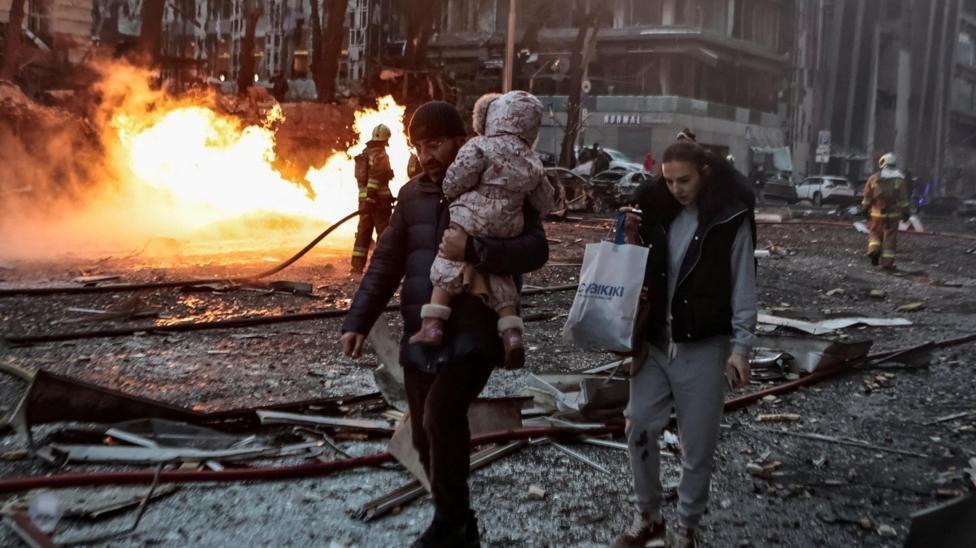In a recent escalation of hostilities between Ukraine and Russia, five individuals were reported killed following a Ukrainian strike in Russia’s western Kursk region, attracting significant attention. The attack occurred in the town of Rylsk, with acting governor Alexander Khinshtein stating that, in addition to the fatalities, nine people were hospitalized due to the incident. The strike also caused damage to local infrastructure, including a cultural center, a fitness complex, a school, and residential homes. Initial reports suggested that six fatalities had occurred, including a child; however, this was later revised to five, with Khinshtein clarifying that none of those killed were children. The ongoing conflict has persisted in the region, with Ukrainian forces launching a cross-border offensive that has resulted in them holding parts of the Kursk area since August.
Simultaneously, Ukrainian officials reported a fresh missile strike on the capital city, Kyiv, causing damage to a building housing multiple embassies, although there is ambiguity regarding whether this building was the intended target. The strikes resulted in at least one death and nine injuries, but reports indicate that embassy staff was likely unharmed in the attack. In a verified video of the aftermath, St Nicholas Cathedral in Kyiv was shown with shattered windows, indicative of the extensive violence being perpetrated in and around urban centers in Ukraine. The Ukrainian military noted that the Russian assault involved 65 drones and missiles launched overnight, with many intercepted by defense systems, highlighting the intense and ongoing military exchanges.
The impact of the strikes on civilians has been profound, as depicted through the experiences of local residents. One man, whose restaurant faced severe damage, expressed his rage against Russian aggressors during a video recording. Another resident, Oksana, shared harrowing details of her apartment being devastated, with shattered glass and debris strewn across her living space. The emotional toll of the conflict on ordinary citizens is palpable, with Oksana stating her disbelief at having survived the destruction and describing a neighbor who remains in shock. These narratives reveal the deep psychological scars carried by those directly affected by the violence.
Local journalists suggest that one of the buildings targeted in Kyiv may have housed operations of the Ukrainian Security Service (SBU), indicating possible motives behind the strikes. The Russian defense ministry confirmed that their missile strikes were in retaliation for a perceived Ukrainian assault on a chemical plant in Russia’s Rostov Region, which occurred just days prior. There is also speculation connecting the attack to the recent death of a prominent Russian general, indicating that there could be further strategic motivations driving these hostilities. This escalation occurred shortly after President Vladimir Putin’s year-end press conference, where he hinted at a possible increase in missile attacks targeting Ukrainian urban centers, emphasizing the volatile nature of the ongoing conflict.
Tensions in Ukraine heighten surrounding the potential use of advanced weaponry, specifically the Oreshnik intermediate-range ballistic missile, which Russia reportedly test-fired earlier in the month. On the morning of the attack, Ukrainian officials enacted an air alert for possible missile launches, urging residents to seek shelter urgently; however, it was later clarified that this alert was a false alarm. Such incidents reflect the precarious nature of safety in Ukraine, where each report of an incoming strike leads to widespread panic and preparations among civilians. The specter of further attacks looms large, keeping the populace in a constant state of uncertainty.
As hostilities continue, the humanitarian impact grows increasingly severe, with resident experiences in Kyiv and Rylsk serving as stark reminders of the human cost of this conflict. Buildings, often housing families and communities, have been devastated, leaving residents grappling with loss and trauma. The targeted nature of these attacks, especially against essential infrastructure, raises considerable concerns about the broader implications for diplomatic relations and the potential for an escalation of violence as both sides reassess their military strategies. With ongoing military operations and retaliatory strikes shaping the daily lives of those in both Ukraine and Russia, the urgency for a resolution to this cycle of violence remains ever more pressing.

